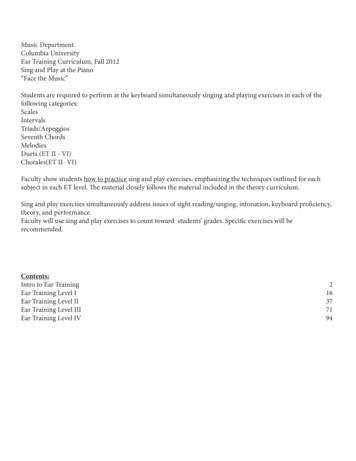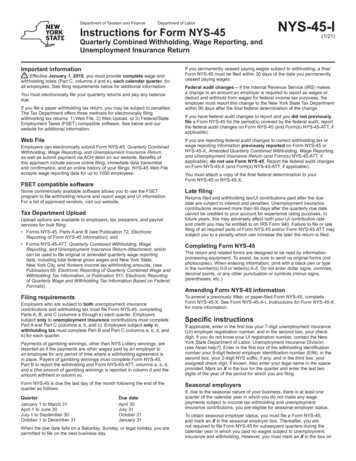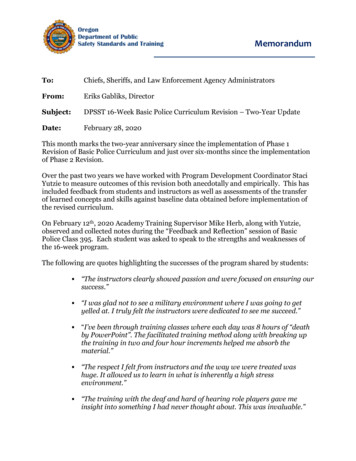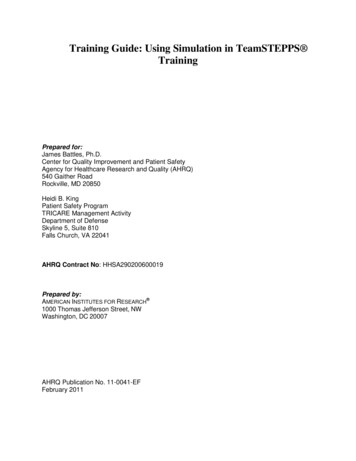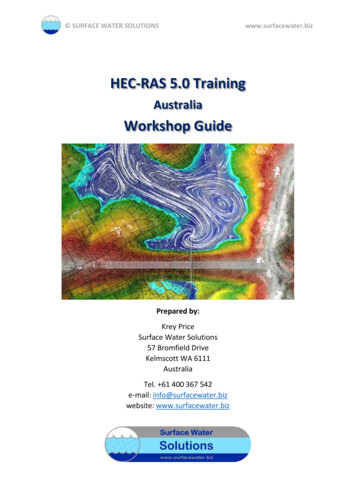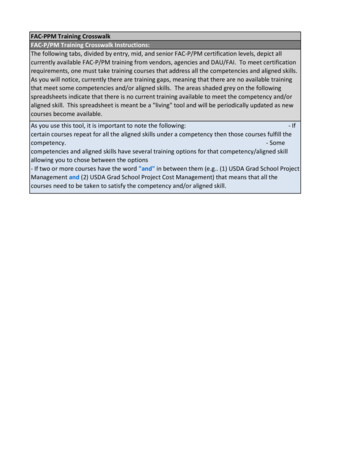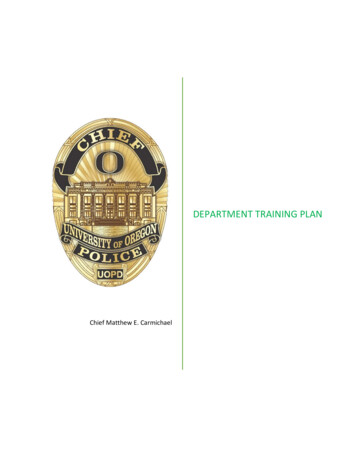
Transcription
DEPARTMENT TRAINING PLANChief Matthew E. Carmichael
Page 1 of 37ContentsMission Statement . 5PURPOSE: . 5TRAINING CATAGORIES. 6Level 1 - Mandatory . 6Level 2 – Essential . 6Level 3 – Desirable . 7LAW ENFORCEMENT PROFESSIONAL TRAINING . 7LEADERSHIP TRAINING. 9EMPLOYEE PROFESSIONAL DEVELOPMENT PLAN . 10TRAINING ASSIGNMENT . 10TRAINING MANAGEMENT SOFTWARE . 10IN-SERVICE TRAINING . 11ANNUAL REVIEW. 12COMMUNITY BASED EDUCATION (CBE) . 12Understanding Implicit Bias . 12Glide Leadership Training . 14DE-ESCALATION TRAINING . 14TRAINING GUIDELINES . 14COMMAND STAFF / ADMINISTRATION . 16CHIEF . 17Mandatory . 17Essential . 17Desirable . 17CAPTAIN . 18Mandatory . 18Essential . 18Desirable . 18EXECUTIVE COORDINATOR (OFFICE OF THE CHIEF) . 19Mandatory . 19Essential . 19
Page 2 of 37Desirable . 19CRIMINAL INTELLIGENCE ANALYST / LAW ENFORCEMENT PLANNER . 20Mandatory . 20Essential . 20Desirable . 20OPERATIONS DIVISION. 21PATROL - SERGEANT . 22Mandatory . 22Essential . 22Desirable . 22POLICE OFFICER. 23Mandatory . 23Essential . 23Desirable . 23INVESTIGATIONS UNIT – DETECTIVE SERGEANT . 24Mandatory . 24Essential . 24Desirable . 24INVESTIGATIONS UNIT - DETECTIVE . 25Mandatory . 25Essential . 25Desirable . 25PROPERTY/ EVIDENCE TECHNICIAN . 26Mandatory . 26Essential . 26Desirable . 26SECURITY AND SPECIAL EVENTS . 27DIRECTOR . 28Mandatory . 28Essential . 28Desirable . 28
Page 3 of 37COMMUNITY SERVICE SERGEANT . 29Mandatory . 29Essential . 29Desirable . 29COMMUNITY SERVICE OFFICER . 30Mandatory . 30Essential . 30Desirable . 30SPECIALITY ASSIGNMENTS . 31DEFENSIVE TACTICS - INSTRUCTOR . 32Mandatory . 32Essential . 32Desirable . 32DRIVER TRAINING INSTRUCTOR. 32Mandatory . 32Essential . 32Desirable . 32CPR / FIRST-AID / BLOODBORNE PATHOGENS - INSTRUCTOR . 33Mandatory . 33Essential . 33Desirable . 33RANGE MASTER/FIREARMS INSTRUCTOR . 33Mandatory . 33Essential . 33Desirable . 33COMMUNICATIONS / RECORDS. 34RECORDS SPECIALIST . 35Mandatory . 35Essential . 35Desirable . 35COMMUNICATIONS LEAD . 35
Page 4 of 37Mandatory . 35Essential . 35Desirable . 36COMMUNICATIONS OFFICER . 36Mandatory . 36Essential . 36Desirable . 36
Page 5 of 37Mission StatementThe University of Oregon Police Department has an interest and responsibility for continualgrowth and development of UOPD personnel. Through combined efforts in areas ofprofessional training and personal education, an employee can meet career goals, achievingboth professional and personal excellence. By aiding development of personnel, we ensure theypossess the knowledge and skills necessary to provide a professional level of service to meetthe needs of the community.PURPOSE:The purpose of the UOPD Training Plan:1.2.3.4.5.Meet mandated, essential, and desirable training requirementsEnhance the level of law enforcement service to the publicIncrease the technical expertise and overall effectiveness of our personnelProvide for continued professional development of department personnelPromote a philosophy of community policing throughout the department.This training plan is designed to identify and set priorities for the training needs of everyrank/position and task/specialized assignment within the Department. The Plan should be usedas an objective tool to assist with bringing uniformity and consistency in training, whileproviding employees with the greatest opportunity for success. It is a tool to be used bysupervisors and managers on a regular basis in their effort to meet training needs of employeesand/or evaluating training requests.The UOPD will strive to use a broad spectrum of training sources for the educational andprofessional development of employees. Whenever possible, the department will use coursescertified by the Department of Public Safety Standards and Training (DPSST)Furthermore, the UOPD will apply non-traditional immersive methods for educating ourpersonnel on how to best understand and meet the needs of our community. This style oftraining mandates our partnership and collaboration with our community. We intend to learnabout our community from members of our community. It is understood that the training plandoes not identify all of the training that will occur for the members of the UOPD. Additionally, itdoes not guarantee a member will receive all of the training identified for his/her position, withthe exception of the training identified as mandatory.
Page 6 of 37To ensure employee development consistent with the needs of the organization we place anemphasis on three areas:1.2.3.4.Law Enforcement Professional TrainingLeadership TrainingEducationCareer/Employee Development PlanThis plan is a living document based on the following:1.2.3.4.Changes to department priorities based on the needs of our communityChanges in Federal, State and local legislationAccess to updated technologiesRequirements of DPSSTThe basic purpose of this document is to serve as a flexible guide to assist in bringingprofessional law enforcement services to the University of Oregon.TRAINING CATAGORIESThe following identifies the training categories referenced in this plan. Training needs havebeen divided into the following three priority levels.Level 1 - MandatoryStatutory/Regulatory training falling under this category is "required" either by statue or bysome regulatory agency or organization with authority to set standards for law enforcement.The department shall meet all mandated training standards and requirements.Level 2 – EssentialEssential training is training the department has determined necessary for an employee inorder to optimize their effectiveness in a particular position or assignment. Unless specificallyindicated otherwise in the manual, the department will attempt to give all essential trainingduring the first 24 months of an assignment. In situations where scheduling does not allow theemployee to receive the essential training in the first year, an attempt will be made to place theemployee in essential training as soon as department staffing and course availability allow.
Page 7 of 37Level 3 – DesirableThose training courses listed as desirable are courses or classes that department hasdetermined are most likely to be useful for employees in the indicated positions orassignments. The list of desirable courses is not meant to be all inclusive and employees in anyposition may receive training other than those indicated as desirable, if specific needs of theemployee or the department require it.LAW ENFORCEMENT PROFESSIONAL TRAININGThe basic training authorized and mandated by the Oregon Department of Public SafetyStandards and Training (DPSST) is the baseline priority of this plan. These courses are availablefor both sworn and non-sworn personnel, whose job description supports the need forspecified or requested training. The UOPD also utilizes various methods to deliver educationand training to our staff. Included in this training is the PoliceOne Academy.The PoliceOne Academy takes advantage of the latest technology to provide online, videobased training to police departments. The Academy offers a wide range of video courses and arobust tracking system to ensure all courses are documented. More than 1000 video coursescovering more than 40 different topic areas are included in the PoliceOne Academy. Some ofthe areas of interest are firearms, defensive tactics, crime scene investigation, narcoticsinvestigations, corrections, K9, pursuit and report writing. The PoliceOne Academy trainingvideo library includes more than 120 experts from all over the United States. This gives theofficers varied perspectives on topics. PoliceOne Academy training is authorized and accreditedthrough DPSST.The UOPD also utilizes Law Enforcement Professional Training that is not certified by DPSST butmeets the needs of our department. This may come in the form of in-house instruction, such asfirearms, defensive tactics, support services training, and UO specific training. In-houseinstruction is the responsibility of and managed by the Professional Standards and TrainingCaptain. This type of training provides “hands-on” continuing professional training toDepartment employees. All officers are assigned to mandatory training days to update basictraining needs. Additional to this category is the use of programs such as Project Implicit andtying UOPD training into the new campus engagement program.Project Implicit is a non-profit organization and international collaborative network ofresearchers investigating implicit social cognition - thoughts and feelings outside of consciousawareness and control. Project Implicit is the product of a team of scientists whose resear
Standards and Training (DPSST) is the baseline priority of this plan. These courses are available for both sworn and non- sworn personnel, whose job description supports the need for specified or requested training. The UOPD also utilizes various methods to deliver education and training to
